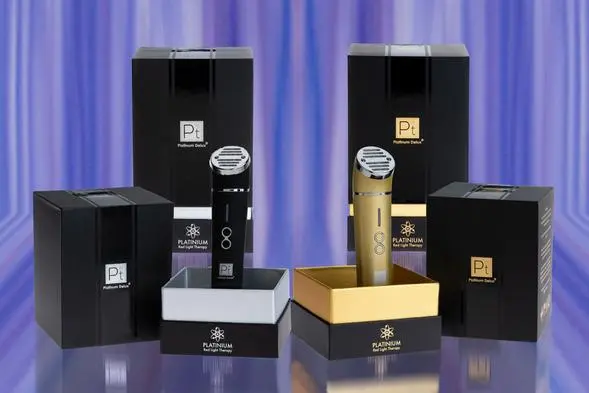
At-Home Platinum LED Light Therapy Tools to Add to Your Routine
At-Home Platinum LED Light Therapy Tools to Add to Your Routine
Introduction
You've probably heard of the benefits of light therapy before. You might even have read about it in a magazine or seen it on your favorite influencer's Instagram story. But just how does this treatment work? And what are the best at-home Platinum LED light therapy tools? In this post, we'll answer all your questions so you can start using one of these devices for yourself.
At-home Platinum LED light therapy tools have fewer LEDs and emit a lower dosage of infrared light than treatments in a professional setting, but they can still be beneficial.
At-home LED light therapy tools have fewer LEDs and emit a lower dosage of infrared light than treatments in a professional setting. But they can still be beneficial for getting rid of acne and acne scars, which is why so many people are using them.
-
LED stands for "light emitting diode." It's a form of treatment that uses infrared light to fight signs of aging like fine lines, wrinkles, brown spots and uneven skin tone.
-
Infrared wavelengths penetrate deeply into the skin's layers to stimulate collagen production, stimulate blood flow and repair damaged tissue (like post-inflammatory hyperpigmentation).
"It's been demonstrated that the sun's energy can trigger our skin cells to produce more collagen and elastin, which are proteins that keep the skin firm," says Zeichner.
"It's been demonstrated that the sun's energy can trigger our skin cells to produce more collagen and elastin, which are proteins that keep the skin firm," says Zeichner. "In addition, research shows that UV light may help rejuvenate skin by increasing cell turnover."
Sun exposure is not recommended for children or pregnant women, but if you're an adult willing to take the risk of burning your skin in pursuit of a better complexion, we say go for it—but know there are plenty of other non-sun-related ways to increase collagen production too.
If you want to try Platinum LED light therapy at home, you may find this information intimidating, but it's important to know how these tools work on your skin and what their primary benefits are.
If you want to try Platinum LED light therapy at home, you may find this information intimidating, but it's important to know how these tools work on your skin and what their primary benefits are.
First things first: What is Platinum LED light therapy? It’s a fairly new treatment that uses a small handheld device with an LED light panel at one end. You can use the tool like an ordinary flashlight or penlight in order to expose your face, neck, chest and other areas of concern to powerful therapeutic wavelengths of light (from reds through blues) that penetrate deep into the skin. These wavelengths stimulate collagen production in the dermis (the second layer of skin), increase circulation and reduce inflammation – all while improving elasticity and reducing acne breakouts or hyperpigmentation due to sun damage over time.
They're safe for all skin tones and types, though people with darker skin should not use red light since it may cause hypopigmentation (lightening of the skin).
The red light is the only wavelength that can cause hypopigmentation, so it's recommended that you avoid using red light if you have darker skin. If you do decide to try the red light, make sure to consult with your dermatologist first. The other wavelengths are safe for all skin tones and types, though people with darker skin should not use blue or violet lights because they may cause hyperpigmentation (darkening of the skin).
The good news is that blue and purple lights aren't as effective as green or red ones in terms of overall health benefits anyway, so if you're going to be using a device at home I'd recommend sticking with those two options over anything else.
They're also pain-free and noninvasive, though you may feel a slight warming sensation.
-
Pain-free and noninvasive.
-
You may feel a slight warming sensation.
-
The warmth you experience from LED light therapy is not painful, but it's important to check in with your body and see what feels good for you. If the warmth makes your skin burn or feel irritated, then you should stop using the device immediately.
-
The same goes for tingling sensations: if they start to hurt or feel uncomfortable, stop using the device immediately!
Platinum LED light therapy devices can give you similar benefits as professional devices, in your own home
Platinum LED light therapy devices can give you similar benefits as professional devices, in your own home.
LED light therapy devices use infrared light wavelengths to address certain skin issues, like acne, wrinkles and fine lines. The technology has been used by dermatologists for years and is becoming more popular among at-home users who want to take advantage of the benefits without committing to in-office treatments.
What is LED light therapy?
LED light therapy is a form of phototherapy that uses red and near-infrared lights to treat the skin. LEDs are small semiconductor devices that emit light when an electric current passes through them. The term “LED” refers to both a device and its resulting color, which is what makes it so versatile as a treatment tool for your skin.
The use of LEDs has been around since 1962, but they have become increasingly popular in recent years due to their cost effectiveness and efficacy compared with other light therapies like lasers and IPLs (intense pulsed light).
How does it work?
LED light therapy is a non-invasive treatment that uses light to stimulate your skin. LED lights are used in many common treatments including lasers, which penetrate the skin in order to treat a variety of conditions like acne or wrinkles. LED light therapy offers similar benefits but without any invasive procedures. This can be especially helpful for people who want the benefits of LED treatments but aren't able to get them because they have sensitive facial skin or other medical conditions that make it difficult for them to undergo more invasive procedures such as laser treatments.
Are there any risks of using a facial light therapy mask?
The short answer is yes. The longer answer is that you shouldn't use any type of at-home facial light therapy mask if you have:
-
Skin issues like acne, rosacea or eczema.
-
Sunburned skin.
-
Damaged or sensitive skin from previous treatments (like microdermabrasion).
If you have any of these conditions, speak with your dermatologist before using any type of light therapy device to ensure it's safe for your specific needs and concerns.
Can you do too much LED light therapy?
You can overdo it with LED light therapy, but it's unlikely. You can get too much of a good thing—this is why people are advised not to drink more than one bottle of wine per day (or you'll feel the effects). The same goes for LED technology: if you're using your device every day and don't see any results, it may be time to switch up your routine. If you're seeing positive changes in your skin, however, there's no need to stop using your device until you've reached its recommended usage time frame (usually around 30 minutes).
What are the benefits of using an LED mask?
-
Reduces wrinkles and fine lines.
-
Improves skin tone and texture.
-
Reduces acne, acne scars, and blemishes.
-
Reduces hyperpigmentation (dark spots).
-
Improves skin elasticity.
-
Improves skin hydration levels by increasing moisture retention in the epidermis (the top layer of your skin).
-
Increases firmness in the dermal layers below the epidermis that support blood vessels, collagen fibers, and elastin fibers to help reduce signs of aging such as sagging or loss of volume around the eyes, mouth and cheeks
Does LED light therapy actually work for acne and acne scars?
Does LED light therapy actually work for acne and acne scars?
LED light therapy is a safe, effective treatment for mild to moderate acne that can help clear the skin. In addition to reducing inflammation and redness, LED light therapy encourages collagen production in the skin which can improve the appearance of scars left by acne. However, it's important to note that while LED light therapy has been proven effective in treating mild-to-moderate cases of acne, it is less effective than prescription medications such as retinoids (such as Retin-A).
Despite its limitations when used alone or with other treatments, there are several reasons why we consider LED light therapy an essential step toward better skin: 1) It's easy on your wallet; 2) It requires minimal maintenance; 3) You can use it at home or take it on the road; 4) It won't interfere with other skincare products you may already be using (like moisturizers or serums); 5.) It's noninvasive so there's no risk of side effects like dryness or irritation--and 6.) You don’t have to worry about irritation if you're pregnant!
Before you hit "add to cart," consider this.
Before you hit "add to cart," consider this.
-
Quality. Before buying a light therapy tool, find out how it's made. Some companies use cheap materials and construction that won't last long or will only work for a few weeks before breaking down completely. Other companies spend more money on better quality products that come with warranties and guarantees of their longevity. It might be worth paying a little extra for such peace of mind—especially if you've never used the product before and don't know how well it works or what kind of results to expect in your skin care routine!
-
Skin sensitivity/type compatibility. If you have sensitive skin, make sure any at-home light therapy tool is safe to use on your face or body without causing irritation or redness (and let us say again: redness isn't cute). If there are no instructions included with the product itself, ask customer service about whether or not their customers reported any adverse reactions while using their products; this will give you an idea as to whether they're safe enough for regular use without making things worse!
Light therapy is considered one of the safest, most effective, and easiest forms of skin care.
Light therapy is an emerging non-invasive treatment that works to treat different skin conditions. Light emitting diodes (LED), which are used in the treatment, have been proven to be effective for treating acne and other skin conditions.
The best part about this type of therapy? It can be done at home on your own time with a device you can purchase online. Who wouldn’t want that kind of flexibility?
Conclusion
Having a light therapy device in your home is an easy way to take care of your skin. It can be used daily (or multiple times a week) to help improve the health and appearance of your skin. It's noninvasive, pain-free, and there are no side effects to using this type of treatment at home.
People also ask
What color light therapy is best?
How many times a week should you use red light therapy?
What serum should I use with red light therapy?
How long should you use red light therapy on your hair?
What do the different colors of light therapy do?
How often should you use red light therapy on your face?








